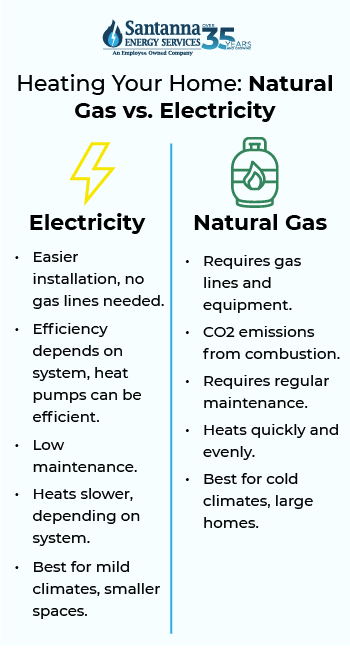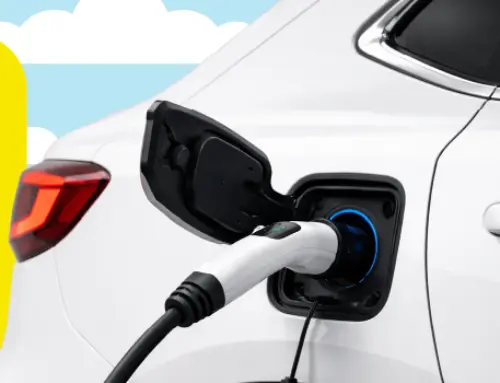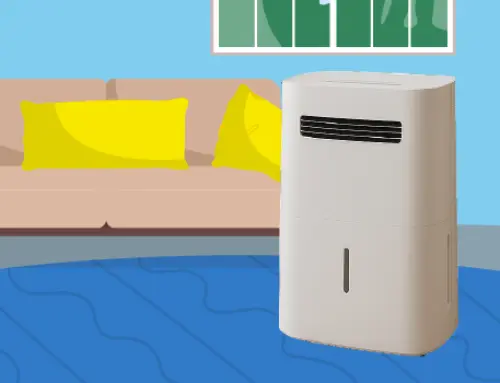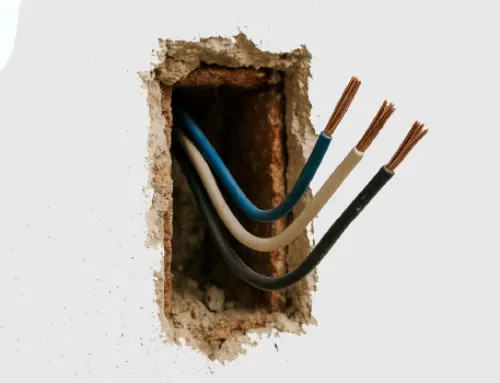Comparing Natural Gas vs Electric Heating Which is Right for Your Home
by Tyler Castle
19.3 min read
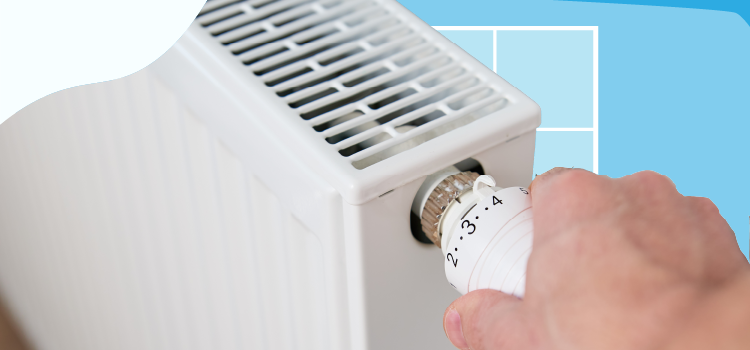
Heating your home is one of the largest energy expenses, typically accounting for about 29% of your utility bill. Knowing which system is right for you makes a huge difference in the cost of your utility bill. Natural gas and electric heating dominate the market, each offering distinct advantages and challenges. Understanding the trade-offs between these systems can help homeowners make a choice that aligns with their unique needs.
By assessing your budget, local climate, and environmental priorities, you can choose the heating system that best meets your needs, ensuring comfort, efficiency, and long-term savings. Read on to explore the comparison of natural gas and electric heating systems to determine which one is the best fit for your home.
Key Points of This Article:
- Natural gas is typically the most efficient and cost‑effective heating option in cold climates, while electric heat pumps work best in milder regions.
- Electric heating systems offer clean, versatile options but can become expensive or less effective in extreme cold, whereas natural gas systems provide strong, reliable heat.
- Both heating types have environmental impacts, with natural gas producing emissions and electricity depending on how the power is generated.
- The best choice depends on climate, home infrastructure, energy prices, and personal priorities, and homeowners can further improve efficiency through insulation, maintenance, and smart usage habits.
What Is the Most Efficient Way to Heat a Home?
In colder climates, high-efficiency natural gas furnaces are often more cost-effective and provide consistent heating. In milder climates, electric heat pumps offer high efficiency and the added benefit of cooling during warmer months. If you're choosing between natural gas and electric heating, you should consider local energy prices, climate conditions, and environmental priorities for your ultimate heating option.
When considering the most efficient way to heat your home, the choice is up to you!
We understand that every home and homeowner has unique heating needs. That's why we offer a range of heating options tailored to your climate and budget. Whether you're considering natural gas or electricity for your home heating option, we can help you find the perfect solution. Check your eligibility for our energy plans and see how we can make your home more comfortable!
Heating with Electricity vs Natural Gas
If you're still not sure which direction to go, don't worry, we have you covered! Let's examine the main differences between heating your home with natural gas vs. electricity:
Electric Home Heating Systems
Electric heating systems use electricity as their power source to generate heat for homes and buildings. Compatible with renewable energy sources, such as solar and wind, electric heating systems are increasingly popular in energy-efficient homes.
Here's how electrical heating works: electricity flows through heating elements (e.g., resistors or coils), converting electrical energy into heat. Advanced systems, such as heat pumps, work by transferring heat from outdoor air, ground, or water into the home, even in cold weather.
If you're considering electricity vs. natural gas, electrical heating systems are ideal for smaller homes or apartments particularly areas without natural gas infrastructure. Regions with milder climates where heating needs are moderate can get by with electricity for their heating needs.
Electric Heating Systems for Homes
Electric heating systems for homes are an energy-efficient and versatile solution for keeping your living spaces warm during colder months. These systems use electricity to generate heat, offering a variety of options. Here are some of the most common available for your electric home heating needs
Electric Furnace
Electric furnaces use electric heating elements to warm air, which is then distributed throughout the home via a duct system. Furnaces are ideal for larger homes that require consistent, powerful heating during colder months.
Electric furnaces are safe and clean with no combustion emissions and are easy to maintain with fewer moving parts compared to gas systems. This electric heating system works well in homes with existing ductwork for central air conditioning.
Keep in mind that if you're deciding between heating with gas vs. electric heat, electric furnaces often have higher operational costs in areas with expensive electricity rates and requires sufficient electrical capacity in the home.
Electric Heat Pump
Electric heat pumps transfer heat from outside air, the ground, or water into the home during winter and reverse the process to cool in summer. Heat pumps are ideal for homes in moderate climates where extreme cold is rare. This home heating option doesn't work particularly well in subfreezing temperatures, as the efficiency of the system decreases when outdoor temperatures drop significantly.
However, electric heat pumps are extremely energy-efficient, with some models achieving up to 300% to 400% efficiency or even higher, that's three to four times as much energy in the form of heat as they're using in electricity. Some heat pumps provide year-round comfort by doubling as an air conditioner.
Baseboard Heaters
Baseboard heaters use electric elements to heat air near the floor, which rises to warm the room via natural convection. Baseboard heaters are best for zoned heating in individual rooms or smaller spaces, such as offices, bedrooms, or home additions.
If you're considering electric home heating, baseboard heaters are easy to install without the need for ductwork and have low upfront costs compared to centralized systems. These electric heating systems for homes allow for room-by-room temperature control, reducing energy waste. Keep in mind that these heaters are less efficient for whole-home heating in larger spaces.
Is Natural Gas Used to Heat Homes?
Gas heating systems rely on natural gas or propane to generate heat for your home. Heating with natural gas is a common choice in colder climates because of its high heating capacity and efficiency.
Natural gas heating systems use combustion to generate heat, which is then distributed throughout the home. Natural gas heating is efficient, cost-effective, and provides powerful warmth, making it ideal for colder climates.
Some of the most common uses of natural gas in a home aside from heating include:
Cooking: Provides instant, precise temperature control, making it ideal for efficient and consistent cooking.
Heating Water: Heats water quickly and efficiently, perfect for homes with high hot water demands.
Heating Your Home: Delivers reliable and cost-effective warmth, especially in colder climates.
Drying Your Clothes: Dries clothes faster and uses less energy, ideal for busy households.
Natural Gas Home Heating Systems
If you're looking to explore your home heating options, we've got you covered! Natural gas home heating systems are ideal for areas that experience intense cold and have large needs for heat. Let's examine some of the most common home heating options for natural gas and cover if natural gas is truly used to heat homes.
Vented Heaters
Vented heaters run on natural gas or propane and are designed to heat spaces from 300 to 3,000 square feet. Vented heaters are ideal for larger spaces requiring a permanent heating solution, such as homes or sizable rooms.
Wall Furnaces
Wall furnaces are a type of vented heater that can be installed between wall studs, drawing in cool air, heating it, and expelling warm air. They are typically powered by electricity or gas and are designed to provide targeted heating to specific areas or rooms in a home. These compact units are an excellent option for smaller spaces, such as apartments, cabins, or individual rooms.
Vent-Free Heaters
For this home heating option, went-free heaters use auxiliary gas heaters that don't require venting, available in blue flame or infrared (radiant) options. These vent-free heaters can cover areas of up to 200 to 1,200 square feet. Vent-free heaters are best for sunrooms or spaces needing supplemental heat without venting.
Infrared (Radiant) Heaters
Infrared heaters, also known as radiant heaters, use electromagnetic radiation to heat objects directly rather than warming the air. This method provides fast and efficient warmth, making these heaters ideal for spaces like garages or workshops where retaining heat in objects is essential. However, they require safety precautions, as the direct heat can pose a burn risk if improperly handled or placed near flammable materials.
Heating with Natural Gas vs. Electric: Which Performs Better?
Choosing between electric home heating and natural gas home heating depends on various factors. One of the most important things you should consider with your choice is which home heating option performs the best. We've broken it down, so you don't have to:
Natural Gas Heating Performance
Natural gas heating – like furnaces – provides rapid, high-output heating, making them ideal for warming homes during the coldest months. Natural gas heating maintains efficiency regardless of outdoor temperatures, ensuring warmth even during severe cold snaps.
Keep in mind that older gas heating systems may rely on outdated ductwork or radiators that unevenly distribute heat throughout the home. Gas heating depends on a steady supply of natural gas or propane. Supply interruptions can affect performance.
Electric Heating Performance
Systems like heat pumps or electric furnaces can work well during the milder autumns and springs. Homes powered by solar or wind energy can lower heating costs and carbon footprints. With electric heating, there's no risk of carbon monoxide or gas leaks, even during extended use.
In subfreezing temperatures, air-source heat pumps lose efficiency, requiring supplemental heating sources (e.g., electric resistance). High electricity rates can lead to significantly higher operating costs for electric heating systems during the prolonged winter season.
Environmental Impact of Natural Gas vs. Electric Heating
When considering your home heating options, it's essential to evaluate their environmental impact. Natural gas and electric heating systems have distinct effects on the environment while electric home heating doesn't. Understanding these differences can help you make an informed decision that aligns with your sustainability goals while keeping your home comfortable. Let's dive deeper into these impacts:
Natural Gas Heating: Environmental Impact
One of the biggest things to know about natural gas home heating options is that natural gas combustion produces carbon dioxide and water vapor. Carbon dioxide directly contributes to greenhouse gas emissions which are harmful for the environment.
Similarly, natural gas is prone to methane leaks. Methane leaks can escape during extraction, transportation, and storage, further increasing its carbon footprint. aA 90% AFUE (Annual Fuel Utilization Efficiency) rating, meaning 90% of the fuel's energy is converted to heat, the remaining 10% escapes through chimneys or other outlets, adding to environmental concerns.
Additionally, as a non-renewable resource, natural gas extraction disrupts ecosystems and contributes to resource depletion. Natural gas combustion also releases nitrogen oxides (NOx), which can worsen indoor and outdoor air quality.
While this might seem overwhelming, there are ways to reduce your environmental impact if you're leaning towards natural gas heating. With our Earth-Friendly natural gas plan, you can help keep things carbon neutral. Earth-Friendly natural gas offsets your carbon emissions!
Electric Heating: Environmental Impact
While electric heating produces zero direct emissions, its environmental impact depends on how electricity is generated. Electricity from coal or natural gas plants has a significant carbon footprint. Burning coal and natural gas releases large amounts of carbon dioxide that contributes to global warming.
Electricity from solar, wind, or hydro sources is nearly carbon-neutral, drastically reducing emissions. To further increase your environmental impact, consider an electric heat pump! Electric heat pumps are highly energy-efficient, often delivering up to 300% efficiency, which reduces overall energy consumption compared to fossil fuel systems. Just keep in mind, heat pumps don't fair well in regions with exterme cold.
Natural Gas vs. Electricity Cost
The cost of heating your home with natural gas or electricity can vary widely depending on factors like energy prices, system efficiency, and your home's location. Let's take a look at some of the average costs and estimates of natural gas vs. electric heating:
Average Cost to Heat a Home with Natural Gas
As of September 2024, according to the E.I.A, the average natural gas rate comes in at 22.74 cents per MCF a month in the U.S. Factors like your location, usage patterns and supplier will affect your monthly rate.
If you're transitioning to heating your home with natural gas, installation costs will play a significant role in your overall expenses. Installing a natural gas furnace typically costs between $3,800 and $10,000, with high-efficiency or modulating models reaching up to $12,000. Gas furnaces are usually installed in basements, utility rooms, or dedicated closets, necessitating adequate space for the unit and proper ventilation.
Heating your home with natural gas also requires access to natural gas lines; if unavailable, extending gas lines can add significant costs.
Average Cost to Heat a Home with Electricity
Heating a home with electricity can be more expensive, with costs varying based on local electricity rates and climate. According to EIA, the average electricity rate for residential customers in 2024 is 16.44 cents per kWh in the U.S.
Installing an electric furnace typically costs between $767 – $3,523 making it a relatively affordable option for home heating. However, older homes may require electrical system upgrades to ensure sufficient capacity for the furnace's energy needs. Electric furnaces are compact and versatile, allowing for installation in various locations, such as closets or small utility spaces, without the need for venting. This flexibility makes them an appealing choice for many homeowners.
Home Heating with Natural Gas: Pros, Cons, and Best Uses
When deciding between home heating with gas vs. electric heat, it's important to weigh out all the pros and cons of both your options. Exploring the pros, cons, and ideal scenarios for using natural gas can help you determine if it's the right option for your home. Let's explore what lies in store if you choose natural gas as your home heating option:
Pros of Natural Gas Heating
Cost-Effectiveness: Natural gas is typically cheaper by 60% than electricity on a per-unit energy basis, making it an economical choice for high heating demands.
Rapid Heating Performance: Natural gas furnaces provide powerful and fast heating, ideal for maintaining comfort during harsh winter conditions.
Energy Efficiency: Modern high-efficiency gas furnaces (90–98% AFUE) minimize energy waste, reducing fuel consumption and operational costs.
Reliable Supply: Natural gas heating systems remain effective even during power outages, provided the furnace has a backup power source for its blower.
Availability: There's been extensive installation of natural gas infrastructure in urban and suburban areas which makes it a readily accessible fuel source for many homes.
Cons of Natural Gas Heating
Carbon Emissions: Methane leaks during extraction and transportation can significantly increase its environmental impact.
Infrastructure Requirements: Homes must have access to natural gas pipelines if they're looking to heat their home with natural gas. Extending pipelines to areas without infrastructure can be costly. Installation also requires venting systems to safely expel combustion gases, adding to initial costs.
Safety Concerns: Risks include potential gas leaks and carbon monoxide poisoning if systems are not properly maintained. If exposed to high concentrations of natural gas, individuals may experience difficulty breathing and chest pain raising health concerns. Regular inspections and the installation of carbon monoxide detectors are essential for safety.
High Upfront Costs: Installation costs for gas furnaces, including venting and ductwork, are higher than those for electric systems.
Natural gas heating offers a powerful, cost-effective solution for maintaining comfort in cold climates but comes with environmental and infrastructure challenges. It's an excellent option for homeowners in areas with established gas networks who prioritize efficiency and affordability.
Home Electric Home Heating: Pros, Cons, and Best Uses
Electric home heating offers a modern, versatile solution for keeping your home comfortable. Like any home heating option, even electricity comes with its share of pros and cons. Let's take a look, so you can make the best decision for your home:
Pros of Electric Heating
Versatility: Electric heating works well in various setups, from baseboard heaters to heat pumps and radiant floor systems. Heating your home with electricity can be used as a primary or supplementary heating source.
Safety: Electric heating has no combustion when generating heat. This eliminates the risks of carbon monoxide or gas leaks. Electric heating is often a safer option for families with children or pets because of the absence of open flames.
Ease of Installation and Maintenance: Electric heating offers simple installation without the need for gas lines or venting. Electric heating systems for your home also require minimal maintenance compared to gas systems.
Eco-Friendly Potential: Electric heating has zero on-site emissions and can be powered by renewable energy (e.g., solar panels), reducing carbon footprint.
Energy Efficiency: Electric resistance heating is 100% efficient at the point of use.
Cons of Electric Heating
Higher Operational Costs: Electricity rates are often higher than natural gas, leading to increased heating costs in colder climates.
Performance in Extreme Cold: Electricity-powered heat pumps lose efficiency in subfreezing temperatures, requiring supplemental heating sources.
Power Dependency: Electric heating relies entirely on electricity, making it vulnerable to power outages.
Initial Cost for Advanced Systems: High-efficiency options like heat pumps or radiant heating systems can have significant upfront costs.
Electric heating is a safe, flexible, and eco-friendly option, particularly when paired with renewable energy. While it may be costlier in regions with high electricity rates or during extreme cold, it's a strong choice for mild climates, smaller spaces, and environmentally conscious homeowners.
What Are My Home Heating Options?
Now that you know the scoop on the difference between heating your home with natural gas vs. electricity, let us fill you in on your home heating options when it comes to plans, suppliers, and more!
When comparing your home heating options, it's important to understand the distinct roles that suppliers and utility companies play in the energy market and how they can benefit your energy choice:
Supplier vs. Utility
Understanding the difference between a supplier and a utility company can help you make the best decision. Knowing the difference between choosing a suppiler vs a utility company can play a role in your options and overall flexibility in your energy choice:
Supplier: Offers energy plans tailored to your needs. As an energy supplier, at Santanna, we focus on providing you competitive pricing, innovative plans, and exceptional customer service to help you find the best plan for your lifestyle.
Utility Company: Maintains the infrastructure and delivers energy to your home. They focus on grid reliability, but have limited plan options and service to cater to your needs and goals.
Home Heating Plans
Finding an energy plan that aligns with your lifestyle and values is key to balancing cost, convenience, and sustainability. Whether you prioritize budget predictability, peace of mind, or environmental responsibility, there's a plan tailored for you. Here are three popular options to consider:
Fixed-Rate Plans: Protect against market fluctuations with a stable rate for a set contract length. These plans are ideal for budgeting, ensuring your rates remain consistent regardless of changes in energy prices.
Unlimited Energy Plans: Enjoy peace of mind with consistent supply costs each month, no matter your usage.* This option is perfect for households with varying energy needs, giving you the freedom to use energy without worrying about unexpected spikes in your bill.
Earth-Friendly Plans: Support eco-friendly energy by offsetting your carbon footprint with a natural gas plan or with 100% renewable energy credits with Earth-Friendly electricity or with carbon offsets to balance out your carbon footprint with Earth-Friendly gas.
Each plan offers unique benefits, so it's important to evaluate your energy habits and priorities to pick the right plan for your home and habits.
Why a Supplier and Why Santanna?
At Santanna Energy Services, we believe in giving you the freedom to choose the energy plan that best suits your needs. We offer a variety of options to match your budget, energy usage, and lifestyle. With Santanna, you have the flexibility to select the plan that works for you, without compromising your home's comfort.
Our exceptional customer service sets us apart. From selecting the right plan to offering continuous support, we prioritize building strong, personal relationships with our customers. We pride ourselves on our rapid response and taking the time to get to know you and your goals as a customer.
By now, you should have a clear idea of which heating option suits your home best—natural gas or electricity. But if not, that's okay! We're here to help, explore your electricity and gas options today and experience the Santanna Difference and check your options here.
What is Home Heating Credit?
If you're in Michigan looking for gas, we've got good news! You might qualify for a home heating credit. The Home Heating Credit is a Michigan program that helps low-income families with heating costs. To qualify, applicants must own or rent and occupy a Michigan home, meet income limits, and not have lived in college housing or care facilities all year.
Eligibility Criteria
- You own or rent and occupy a Michigan homestead.
- You are not a full-time student claimed as a dependent on someone else's tax return.
- You did not reside in college or university-operated housing for the entire year.
- You did not live in a licensed care facility for the entire year.
Overall, Electric Home Heating is Right for You if…
- You live in a mild climate where heating demands are moderate.
- Your home uses or can integrate renewable energy sources like solar or wind for a sustainable energy supply.
- You prefer a safe and clean system without combustion risks or emissions.
- You value versatility, such as systems that can also provide cooling (e.g., heat pumps).
- Your home lacks natural gas infrastructure, making electricity a more accessible option.
Overall, Home Heating with Natural Gas is Right for You if…
- You live in a cold climate requiring reliable, high-output heating.
- Your home has access to natural gas lines, making it a cost-effective choice.
- You're looking for a cost-efficient option with lower energy prices for high heating demands.
- You value long-term efficiency and are willing to handle occasional maintenance for safety.
Ultimately, the choice between natural gas or electricity for your home heating is up to you!
Tips for Maximizing Heating Efficiency
- Seal and Insulate Your Home: Enhancing insulation works hand-in-hand with our fixed-rate energy plans, helping you lock in savings by reducing waste.
- Maintain Your Heating System Regularly: Combining maintenance with one of our tailored energy plans ensures you maximize every dollar spent on heating.
- Upgrade to Energy-Efficient Equipment: Optimize usage and save more.
- Adjust Your Heating Habits: With simple lifestyle adjustments and our energy plans, you can enjoy efficient heating that fits your budget.
- Use a Smart Thermostat: Pairing a programmable or smart thermostat with our energy plans lets you control your heating usage, setting schedules and temperatures that reduce energy waste without sacrificing comfort.
- Close Unused Rooms: Save energy by only heating the spaces you use regularly.
- Take Advantage of Sunlight: Open curtains during the day to let natural warmth in and close them at night to retain heat.
Whether natural gas or electric heating is the best choice for your home depends on your unique needs, lifestyle, and priorities. Both options have their advantages, and the right system for you comes down to factors like climate, energy efficiency, and personal preferences.
* Restrictions apply. Enrollment based upon program eligibility. Customers using more than 125% of normal monthly usage as determined by Santanna may be required to switch plans.
Tyler is an experienced energy professional, having worked for Santanna Energy Services, for the past four years. He is passionate about renewable energy and believes that diversifying the energy grid is the key to a sustainable future. Tyler is dedicated to supplying consumers with the best possible energy solutions and works diligently to make sure that Santanna can deliver the highest quality service.


